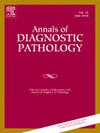Effect of storage temperature on nucleic acid quality in formalin-fixed paraffin-embedded tissue samples
IF 1.4
4区 医学
Q3 PATHOLOGY
引用次数: 0
Abstract
Formalin-fixed paraffin-embedded (FFPE) tissue samples are widely used for genomic analyses in clinical and research settings. However, prolonged storage at room temperature may compromise nucleic acid quality, potentially affecting the reliability of molecular testing. In this study, we investigated the impact of various storage temperatures and repeated temperature changes on nucleic acid quality in FFPE samples. Four surgically resected tumor cases were analyzed. Following cold ischemia times of 29–60 min, tumor tissues were sampled upon arrival at the pathology department, divided into five equal parts, and fixed in 10 % neutral buffered formalin. The resulting FFPE blocks were stored at 18 °C, 4 °C, −20 °C, −80 °C, or − 150 °C. After storage, the blocks were returned to room temperature for sectioning and analysis. DNA and RNA quality were assessed at 3, 6, and 12 months using DNA integrity number (DIN), short-to-long cycle threshold (S/L Ct) ratio, RNA integrity number (RIN), and DV200. Samples stored at 18 °C and 4 °C exhibited time-dependent deterioration in certain indicators, whereas those stored at −20 °C or below maintained stable nucleic acid quality. Despite multiple freeze-thaw cycles, no significant degradation was observed under colder conditions. Our findings suggest that −20 °C storage is a feasible and effective approach for preserving nucleic acid integrity in FFPE tissues. Although limited by a small sample size (n = 4), this study provides practical insights into tissue archiving strategies and supports selective implementation of refrigerated storage for long-term molecular analysis.
保存温度对福尔马林固定石蜡包埋组织标本核酸质量的影响
福尔马林固定石蜡包埋(FFPE)组织样本广泛用于基因组分析在临床和研究设置。然而,在室温下长时间储存可能会降低核酸质量,潜在地影响分子检测的可靠性。在本研究中,我们研究了不同储存温度和反复温度变化对FFPE样品核酸质量的影响。对4例手术切除肿瘤进行分析。冷缺血29 - 60min后,肿瘤组织到达病理科后取样,分成五等份,用10%中性缓冲福尔马林固定。得到的FFPE块分别保存在18°C、4°C、- 20°C、- 80°C或- 150°C。储存后,将样品返回室温进行切片和分析。采用DNA完整性数(DIN)、短-长周期阈值(S/L Ct)比、RNA完整性数(RIN)和DV200在3、6和12个月时评估DNA和RNA质量。在18°C和4°C保存的样品在某些指标上表现出随时间变化的劣化,而在- 20°C或以下保存的样品保持稳定的核酸质量。尽管多次冻融循环,在较冷的条件下没有观察到明显的降解。我们的研究结果表明,−20°C储存是保存FFPE组织核酸完整性的可行和有效的方法。尽管受限于小样本量(n = 4),该研究为组织存档策略提供了实用的见解,并支持长期分子分析的选择性冷藏储存。
本文章由计算机程序翻译,如有差异,请以英文原文为准。
求助全文
约1分钟内获得全文
求助全文
来源期刊
CiteScore
3.90
自引率
5.00%
发文量
149
审稿时长
26 days
期刊介绍:
A peer-reviewed journal devoted to the publication of articles dealing with traditional morphologic studies using standard diagnostic techniques and stressing clinicopathological correlations and scientific observation of relevance to the daily practice of pathology. Special features include pathologic-radiologic correlations and pathologic-cytologic correlations.

 求助内容:
求助内容: 应助结果提醒方式:
应助结果提醒方式:


